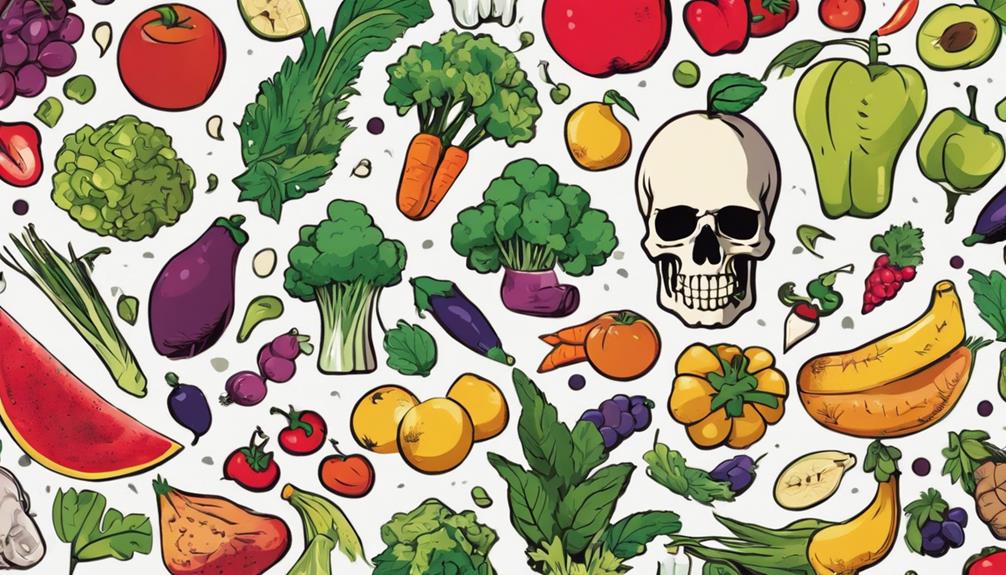The Plant Paradox: The Hidden Dangers in "Healthy" Foods by Steven R. Gundry – Summary and Review

'The Plant Paradox' by Steven R. Gundry reveals hidden dangers in 'healthy' foods like lectins, challenging traditional views on a healthy diet.
It highlights the impact of diet on gut health and inflammation, prompting a reassessment of food choices for better well-being.
Key Takeaways
- Challenging dietary myths and misconceptions
- Revealing hidden dangers in 'healthy' foods
- Prioritizing gut health for overall wellness
- Implementing lectin-free diet changes for better health
The Plant Paradox Overview
In his groundbreaking book, 'The Plant Paradox,' Dr. Steven Gundry challenges conventional dietary wisdom with compelling evidence and innovative insights. Through his work, he debunks prevalent plant paradox myths and lectin misconceptions that have shaped many individuals' views on what constitutes a healthy diet. Gundry's exploration of these myths and misconceptions sheds light on the hidden dangers in foods often perceived as healthy. By questioning the traditional beliefs surrounding plant-based diets, he offers a fresh perspective that empowers individuals to make informed choices regarding their nutrition.
The plant paradox myths that Gundry addresses in his book serve as cautionary tales, urging readers to reevaluate their relationship with certain food groups. Similarly, the lectin misconceptions he dispels challenge long-held assumptions about the impact of these proteins on our health. By unraveling these myths and misconceptions, Gundry invites readers to emancipate themselves from dietary dogma and embrace a more nuanced understanding of nutrition.
Understanding Lectins and Their Impact
Lectins, often overlooked but potent proteins, wield a significant influence on our bodies and health. Found in many plant foods, lectins can be harmful if consumed in excess, leading to lectin toxicity. These proteins have the potential to interfere with the body's normal functions, causing inflammation and disrupting nutrient absorption. Understanding the impact of lectins on health is vital for making informed dietary changes that promote overall well-being.
| Lectin Toxicity | Dietary Changes | Impact on Health |
|---|---|---|
| May cause gut irritation | Reduce consumption of lectin-rich foods | Disrupt nutrient absorption |
| Increase inflammation levels | Increase intake of low-lectin alternatives | Contribute to autoimmune conditions |
| Affect insulin sensitivity | Cook or soak high-lectin foods to reduce lectin content | Influence weight management |
| Aggravate digestive issues | Consider a lectin-restricted diet | Impact overall health and vitality |
| Link to certain chronic diseases | Consult a healthcare provider for personalized advice | Influence energy levels and mood |
Understanding lectins and their effects can empower individuals to make mindful choices that support their health and well-being, paving the way for a balanced and thriving life.
Surprising 'Healthy' Foods to Avoid
Surprisingly, certain foods often touted as 'healthy' may actually be best avoided in order to support overall well-being and health. In a world filled with food misconceptions and health myths, navigating through the pitfalls is crucial in making informed choices for one's well-being. Here are four surprising 'healthy' foods to avoid:
- Fruit Juices: Despite being marketed as natural and healthy, many fruit juices are loaded with sugar and lack the beneficial fiber found in whole fruits.
- Granola Bars: Often perceived as a convenient and nutritious snack, granola bars can be high in added sugars, unhealthy fats, and artificial ingredients.
- Flavored Yogurts: While yogurt can be a good source of probiotics and protein, flavored varieties are typically packed with sugar and artificial additives that negate the health benefits.
- Gluten-Free Processed Foods: Many gluten-free alternatives are heavily processed and contain added sugars, unhealthy fats, and artificial ingredients to mimic the taste and texture of gluten-containing foods.
Gut Health and Inflammation Connection
The intricate relationship between gut health and inflammation reveals a profound impact on overall well-being and vitality. The gut microbiome, a diverse community of microorganisms residing in the digestive tract, plays a significant role in regulating the immune response and maintaining a delicate balance within the body. When this balance is disrupted, it can lead to chronic inflammation, which is increasingly recognized as a root cause of various health issues.
The gut microbiome influences the immune response through complex interactions, affecting the body's ability to defend against pathogens and maintain tolerance to beneficial substances. Disruption in this delicate ecosystem can trigger an inflammatory cascade, contributing to conditions such as autoimmune disorders, obesity, and even mental health issues.
Understanding the connection between gut health and inflammation is essential for cultivating overall wellness. By nurturing a healthy gut microbiome through a balanced and nutritious diet, individuals can support their immune system, reduce inflammation, and promote excellent health and vitality. Embracing strategies that prioritize gut health is a foundational step towards achieving holistic well-being.
Strategies for a Lectin-Free Diet
Starting on a lectin-free diet entails thoughtful meal planning and creative ingredient substitutions. These strategies are essential for maintaining a nutritious and satisfying eating plan while avoiding potentially harmful lectins.
Meal Planning Tips
Crafting a nutritious and satisfying meal plan for a lectin-free diet requires thoughtful consideration of ingredient choices and meal combinations. To assist in this endeavor, here are some valuable meal planning tips:
- Recipe Inspiration: Seek out cookbooks, online resources, and social media platforms dedicated to lectin-free recipes for creative ideas.
- Food Alternatives: Explore a variety of nutrient-dense alternatives such as sweet potatoes, cauliflower rice, and zucchini noodles to replace lectin-rich foods.
- Batch Cooking: Prepare meals in advance to save time and guarantee you always have lectin-free options readily available.
- Mindful Eating: Practice mindful eating habits to savor each bite, enhance digestion, and foster a deeper connection with your food choices.
Ingredient Substitution Ideas
To navigate the intricacies of a lectin-free diet successfully, one must adeptly integrate ingredient substitution ideas that enhance both flavor and nutritional value. Embracing flavorful swaps and creative alternatives can elevate your culinary experience while adhering to the principles of a lectin-free lifestyle. Here are some suggestions to inspire your journey:
| Original Ingredient | Lectin-Free Swap | Benefits |
|---|---|---|
| Wheat flour | Almond flour | Rich in Vitamin E |
| Soy sauce | Coconut aminos | Low in sodium |
| Cow's milk | Almond milk | Dairy-free alternative |
| White rice | Cauliflower rice | Low in carbohydrates |
| Peanut butter | Almond butter | Lower in lectins |
Real-Life Success Stories
Throughout the journey of implementing the principles outlined in The Plant Paradox, individuals have shared remarkable real-life success stories showcasing the transformative power of embracing a lectin-free lifestyle. These testimonials and progress reports serve as beacons of hope for those seeking a path to better health through dietary transformations.
Here are four compelling stories that highlight the profound impact of The Plant Paradox:
- Weight Loss Wonders: Witness individuals shedding excess pounds effortlessly by simply altering their food choices.
- Energy Boost Revelations: Experience newfound vitality and vitality as a result of adopting lectin-free eating habits.
- Gut Health Triumphs: Discover how digestive issues and discomfort fade away with the elimination of harmful lectins.
- Disease Reversal Miracles: Be inspired by tales of individuals who've managed to reverse chronic conditions through the power of plant-based, lectin-free nutrition.
These real-life success stories underscore the notion that true transformation and lasting results are achievable through a mindful approach to food consumption and lifestyle choices.
Final Thoughts and Recommendations
As one reflects on the key takeaways from 'The Plant Paradox', it becomes clear that small changes can lead to significant health improvements.
Implementing actionable steps, such as reducing lectin-rich foods, can potentially transform one's well-being.
The journey to better health often begins with simple yet powerful choices.
Key Takeaways
In reflecting on the insights shared in 'The Plant Paradox,' one can't underestimate the transformative power of incorporating these principles into one's lifestyle. Embracing the impactful insights from the book can lead to a paradigm shift in how one views nutrition and health.
Here are four key takeaways that can empower individuals seeking a path to wellness:
- Challenge Dietary Misconceptions: Questioning traditional dietary advice can lead to a better understanding of how certain foods may impact health.
- Embrace Diversity in Foods: Exploring a wide range of nutrient-dense foods can enrich one's diet and overall well-being.
- Prioritize Gut Health: Nurturing a healthy gut microbiome is essential for optimum health and crucial for vitality.
- Listen to Your Body: Paying attention to how your body responds to different foods can guide you in making personalized dietary choices.
Actionable Steps
One can take charge of their journey to wellness by implementing actionable steps derived from the transformative insights of 'The Plant Paradox'.
Implementing changes based on the principles outlined in the book can lead to a healthier lifestyle and improved well-being.
Begin by gradually reducing or eliminating harmful lectin-containing foods from your diet, such as legumes, nightshade vegetables, and grains. Replace these with nutrient-dense alternatives like leafy greens, cruciferous vegetables, and healthy fats.
Experiment with new recipes and cooking methods to make the shift enjoyable and sustainable. Prioritize organic and non-GMO produce to minimize exposure to toxins.
Frequently Asked Questions
Can Lectins Be Completely Eliminated From the Diet, or Are They Present in All Foods to Some Extent?
In various foods, lectins naturally occur to some degree, making complete elimination challenging. However, through diet modification and proper cooking methods, individuals can mitigate lectin sources, promoting a healthier and more balanced nutritional intake.
Are There Any Potential Long-Term Health Risks Associated With Following a Lectin-Free Diet?
In contemplating a lectin-free diet, one must ponder potential long-term health risks. Lectin toxicity from certain foods could lead to health consequences if not carefully managed. Balancing nutritional needs while avoiding lectins is essential.
How Do Lectins Impact the Body's Immune System and Overall Health Beyond Just Digestive Issues?
Lectins can trigger potential inflammation and immune responses, impacting health beyond digestion. Understanding these effects empowers individuals to make informed choices for their well-being. Awareness is key to sailing the complexities of diet and health.
Are There Any Specific Cooking Methods or Preparation Techniques That Can Help Reduce Lectin Content in Foods?
In the quest for lectin reduction, culinary techniques can be transformative. Strategic cooking methods like soaking, fermenting, and pressure cooking have been hailed for their ability to slash lectin content in foods, offering a path to improved health.
Are There Any Alternative Approaches or Supplements That Can Help Mitigate the Effects of Lectins in the Diet for Those Who Cannot Completely Eliminate Them?
In seeking alternatives for mitigating lectin effects, individuals may explore dietary supplements like lectin blockers. Embracing alternative approaches that support digestive health can also aid in managing the impact of lectins for those unable to completely eliminate them.










